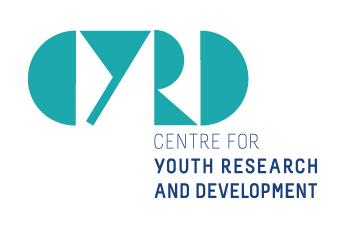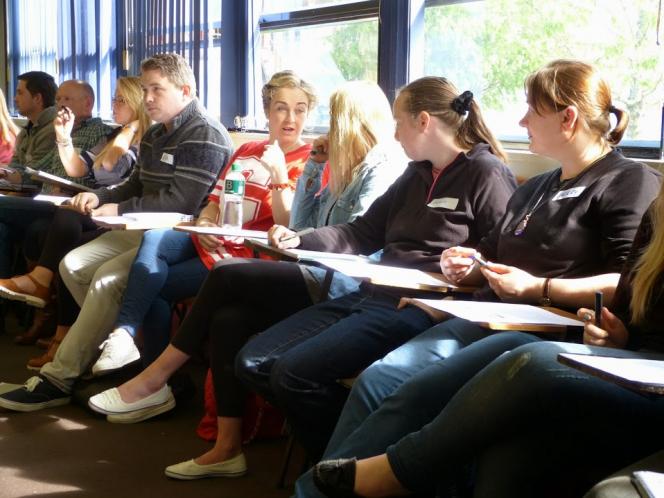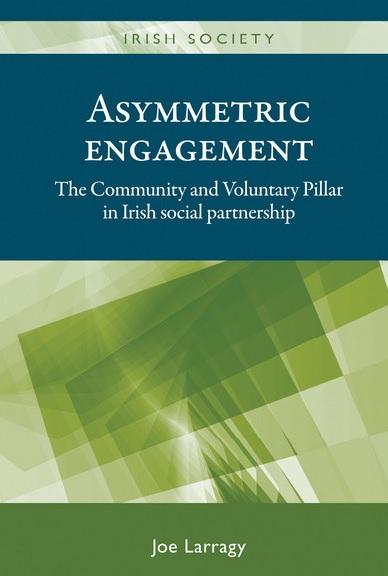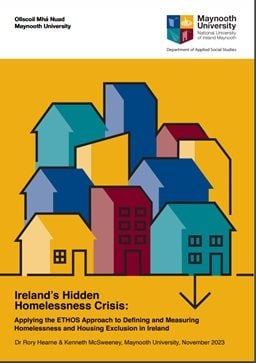The Department has a well established expertise in the areas of human rights, equality and anti poverty work. This expertise is based on practice in these areas, teaching, research and public contributions at a range of levels locally, regionally, nationally and globally. The Department has been aware for some time that although these issues are overlapping in peoples lived experience, within academic and within policy discussion and practice, they have been compartmentalised and boxed separately. Discrimination and poverty often live in the same person. Those experiencing discrimination include disproportionately women, the disabled, older people, migrants and Travellers. Those experiencing poverty include the same people. Whilst issues of discrimination and poverty are not synonymous, are not they are fundamentally linked. In order to realise these links, the Department has established a Centre for Rights, Recognition and Redistribution, which has been formally designated as such by the Maynooth University President. The Centre’s mission is to advance both knowledge and practice in all sectors to inform policy making and academic and public debates and engage stakeholders within the field of rights, recognition and redistribution. The Centre aims to realise this mission through working in an applied context using multi disciplinary and multi combination approaches involving academics and practitioners’ contributions.
The Centre focuses on;
1. Advancement of knowledge
2. Documenting of rights, recognition and redistribution practices
3. Inform policy making
4. Inform academic and public debate
5. Engage inclusively with stakeholders in the field of rights, recognition and redistribution
The Centre builds on existing work in social policy and in Community Work and Youth Work. It seeks to progress on a planned phased basis, starting small, and in time, will seek to provide a range of activities and services including;
1. Conducting applied inclusive research
2. Drawing together key information
3. Holding seminars, conferences,
4. Producing a range of publications
5. Providing advisory and consultancy services
6. Providing a stakeholder forum to consider improved ways of addressing concerns in cases of rights, recognition and redistribution
In addition to pursuing the research and scholarly interests of staff in the Department of Applied Social Studies, the Centre For Youth Research and Development (CYRD) at Maynooth University conducts a range of research projects which are commissioned, funded or otherwise supported by external organisations and agencies.
Recent and current partners and funders include the European Commission, the Department of Children and Youth Affairs, the Combat Poverty Agency/Department of Social Protection, the National Youth Council of Ireland, Youth Work Ireland, the Equality Authority, Kildare Youth Services and Youth Advocate Programmes Ireland (YAP).
Please find more information by visiting the Centre for Youth Research and Development page.
For further details contact: [email protected]. Tel: 353-1-7083781
The Department of Applied Social Studies [DAPPSS] at Maynooth University are currently partnering in the DAPHNE (supported by the European Commission) GAP Work Project: The
EU Daphne III Programme is an EU- wide commitment which aims to contribute to the protection of children, young people and women against all forms of violence.
The Gap work Project aims at supporting Youth Work Practitioners to challenge gender-related violence against (and by) young people through the provision of education and training and research to support youth practitioners to better identify and challenge sexist, sexualising, homophobic or controlling language and behaviour. Other partners in the project include: Brunel University (UK), URV (Spain), UNITO (Italy), and the Institute of Education (UK), as well as a number of training organisations.
Please find more information by visiting the Daphne GapWork Project page.
Please find a selection of photographs from our recent events here.
The Awards seek to acknowledge the contribution of students, past students and partners of the Department of Applied Social Studies professional programmes in Community Work and Youth Work towards the development of a just and equal society in Ireland and beyond.
They are named for John O’Connell in recognition of his contribution as a teacher, activist, analyst and community and youth worker to those goals. John contributed to the Departments programmes, led ground breaking initiatives in recognition of Travellers identity and of the realities of racism in Ireland, supported and started people’s movements for change in Ireland, Europe and the Philippines. Through his passion and innovative teaching many learned the social analysis skills to develop their own struggles.
The awards seek to acknowledge and commend excellence linked to action and outcomes or potential outcomes for young people and communities which are in line with the Mission Statement of the Department, which is: “To contribute to human rights, social justice and equality nationally and internationally through excellence in education for, and development of, the applied social professions, innovative academic education and, research in the social sciences and associated public contributions”. They are made occasionally, depending on the numbers of outstanding persons emerging in each or every category, usually at least every two years.
Categories
1. For a past student of the Departments Professional Programmes whose community and or youth work has made a significant and outstanding contribution towards justice, inclusion and recognition of rights in Irish society or beyond. This award can also be made for recognition of life long contributions.
2. For the student on the Departments Professional Programmes whose commitment to community work and /or youth work as means of intervention for helping create an equal and inclusive society led her/him to make outstanding efforts to address a number of major challenges and obstacles in order to participate and whose participation as a student continued to reflect and enhance this commitment, in an outstanding manner.
3. For a partner of the Departments Professional Programmes whose community and or youth work has made a significant and outstanding contribution towards justice, inclusion and recognition of rights in Irish society or beyond. This award can also be made for recognition of life long contributions.
Details
The Awards are made by the Department of Applied Social Studies, in association with an advisory group of practitioners familiar with/involved in the work of the Department, and the youth work and community work fields.
Nominations are by staff of the Department who welcome suggestions also from colleagues and partners.
The Liberia Solidarity Group (LSG) is dedicated to the creation of a mutual learning partnership between Ireland and Liberia which promotes justice, peace, equality and human rights through collective action and sustainable development. We are concerned to support those working in Liberia to achieve these goals through the development and implementation of education, enterprise and community development activities, including actions that promote or enhance the status of women.
Aims and Objectives
The aim of LSG is to support the promotion of justice, peace, equality and human rights and those working for them by the advancement of education and associated activities.
Objectives:
- To strategically raise awareness in Ireland and Europe regarding Liberia
- To learn and exchange between initiatives in Liberia and Ireland
- To advocate and promote the needs of Liberian people with the Irish authorities, business and other agencies.
- To engage and develop relevant partnerships and actions with groups and organisations in Liberia and Ireland to achieve our overall aim.
- To promote the enhancement of the status of women in all our actions and activities.
- To support projects and deepen partnership already established with community initiatives in Liberia
LSG is comprised of individuals and organisations with an experience of or interest in supporting progressive initiatives in Liberia. Members include:
- Liberians living in Ireland
- Irish people who have worked in Liberia as missionaries, development workers and volunteers
- Media personnel and others who have visited the country and been inspired by people they met.
All who support the aims and objectives of LSG are invited to join us in these endeavours.
Liberia and Ireland
Ireland has a particular standing in Liberia. Irish peace-keeping troops are remembered for their diligence in enforcing the cease fire and for their resolution in protecting vulnerable communities. The contribution of the Irish Government to the re-building project has also enhanced the respect and trust that Liberians have for Ireland. Liberia receives aid as part of Liberia’s bilateral aid programme. Irish Aid contributed significantly to the development of health services as part of an agreed strategy to re-establish public services infrastructure. Among Irish development and aid organisations, both Trócaire and Irish Aid have a significant presence in the country and continue to contribute to vital civil society initiatives. Concern Worldwide also works in Liberia alternating between emergency response and development work with a particular focus on the agricultural sector.
For more information on the Liberia Solidarity Group, please contact:
[email protected] or Anastasia Crickley at 087-2985611/ [email protected]
The Liberian Context
Liberia has emerged from a prolonged period of conflict and turmoil in which upwards of 200,000 have died and countless others were injured, displaced or subject to unimaginable personal trauma. During the civil war approximately 40% of women experienced gender violence. The war left a severely diminished social and economic infrastructure with only rudimentary communications and practically no public utilities such as electricity and water. Unemployment is widespread, running at about 80% according to the World Bank, and there is a substantial food security issue. Liberia is ranked 169 of the 182 countries in the UN Human Development Index.
Despite this appalling scenario a fragile democracy was established in 2005 with the assistance of the international community, including Ireland, whose peacekeeping force played an important role in the disarmament process. With the assistance of the United Nations and international aid organisations basic health services and health related utilities, such as clean water, sanitation, shelter and food are being slowly restored. Schools and colleges have been re-established and there is widespread enthusiasm for education despite poor facilities and a lack of teaching materials. Much of this development is being driven by civil society organisations, including community development groups, women’s initiatives, human rights organisations and community education projects.
While Liberia may be poor in material terms it is rich in ideas, aspirations and determination. Liberian people are committed to building a new society that is stable, just and sustainable, where respect for human rights is embodied in constitutional, legislative and regulatory processes. They also recognise that this can only be achieved with the cooperation and support of northern hemisphere countries and by developing partnerships whereby mutual endeavours can be devised and implemented.
Please read the
Liberia Solidarity Group Brochure
Please follow these links for further information:
The Department has successfully developed a number of NUI certificate programmes, which are generally offered on an outreach basis, sponsored by community based partner organisations. The certificate programmes include:
• NUI Certificate in Youth Work Studies (with Liberties College, Catholic Youth Care)
• NUI Certificate in Community Work in a Changing Ireland (offered with a variety of organisations including Migrants Rights Centre Ireland, Galway Refugee Support Group, Respond Housing Association and Mayo Intercultural Action)
• NUI Certificate In Youth Arts (with National Youth Arts Programme and National Youth Council of Ireland)
• NUI Certificate in Youth Justice (with Catholic Youth Care)
• NUI Certificate in Management and Leadership (with Catholic Youth Care and City of Dublin Youth Service Board)
• NUI Certificate in Equality and Diversity for Early Years Professionals (with Pavee Point)
• NUI Certificate in Professional Supervision
The partnership with sponsor organisations is central to the successful provision and delivery by Maynooth University of certificate programmes. While the majority of teaching and learning takes place of campus, students come on campus to register and participated in a tailored library induction session. Sponsors are also encouraged, and facilitated, to use the Department resources at weekends and outside term time when access to rooms and parking is less constrained.
These programmes themselves and our approach to them highlights the Department’s response and contribution to building the capacity of the community and youth work sectors at a local level to engage with community and youth work associated issues. In addition, the certificate programmes have the potential to support student access to third level education. Quality control and promotion of the programmes is guaranteed through Departmental involvement in selection, teaching, moderation of assessments and final evaluation and review through a designated liaison person.
The Department produces a sponsor’s handbook, and hosts regular meetings with sponsors. If you would like further information about any of these
programmes, please contact the Department at [email protected]
The Department of Applied Social Studies would be glad to hear from those considering commissioning and/or collaborating on any aspect of applied social scientific research, including organisational development. Departmental staff have accumulated extensive experience and expertise in the full range of social research methods, both qualitative and quantitative. In particular, members specialise in participatory research with children, young people, families and communities; action research; narrative enquiry; research with marginalised groups and exploring sensitive issues; equality, diversity and multiculturalism; research assessing the benefits and outcomes of developmental interventions; social work research; multi-method research; and evaluation research.
In addition to the above, the Departmental team includes specialisations in all major aspects of organisation and management studies, including systems development, gestalt approaches, organisational change management, human relations and human resources, and organisational evaluation. Complementing and drawing on these research specialisms the Department also offers the NUI Certificate in Management and Leadership.
Projects in which the Centre for Youth Research and Development is currently involved include research and evaluation studies for Youth Advocate Programmes (YAP) Ireland, the Football Association of Ireland and participation in an evaluation of the youngballymun initiative led by Dr Sinead McGilloway of the Department of Psychology.
Asymmetric Engagement - The Community and Voluntary Pillar in Irish social partnership. Manchester University Press. 2014
On 9th September 2014, the Department hosted the launch of a new book by Dr Joe Larragy.
Asymmetric Engagement - the Community and Voluntary Pillar in Irish social partnership, published by Manchester University Press.
It is a study of one of the most innovative features of neo-corporatist institutions in Ireland whereby community and voluntary sector organisations concerned with unemployment, marginalized communities, poverty, women and several other minority interests and causes became social partners. These developments have been regarded in a range of ways but seldom studied systematically or in detail. The book aims to address the deficit in both empirical and theoretical terms.
Professor Philip Nolan, President of Maynooth University, who launched the book, commented: “This is a fascinating, insightful and important book: applying both a thorough empirical approach and a sophisticated theoretical framework to the community and voluntary pillar of Irish social partnership, Dr Larragy has advanced an utterly new conceptual lens with which to study the successes and shortcomings of community and voluntary groups as political and policy influencers. It is a significant intellectual achievement, and a major contribution to our understanding of civil society. We are deeply proud, as academic colleagues, and as an institution, of this groundbreaking work.”
The book launch, in the new Library at Maynooth University, was preceded by a well attended roundtable/seminar on the theme: “Time for a new social contract”, with contributions from Prof. Sean O Riain, Dr Mary Murphy, Anastasia Crickley, Anna Visser, Dr Sean Healy and Professor Fred Powell and chaired by Dr Larragy. Professor Powell said that the book was a very significant and scholarly contribution to the understanding of civil society and a roadmap for the advancement of democracy: “I think this book makes a very important contribution to the understanding of civil society in Ireland. Its case studies bring a unique insight into Irish governance and understanding of 'citizenship from below’. The scholarship is superb. It should be widely read.”
At the launch, Dr Larragy said that the book started out from the lack of agreement on how to characterise the role of community and voluntary associations in a tripartite system of negotiated governance: “While critiques of the innovation emerged from the left, the right and the centre, most views were not well-grounded in theoretical and empirical analysis. Typically views included incorporation, unjustified influence to small groups, distraction and “froth”. The book is a case study that focuses on the Pillar as a whole and on four pivotal component organisations or associations within the Pillar, namely, the Irish National Organisation of the Unemployed (INOU), the Community Workers Co-op (CWC), the Conference of Religious in Ireland Justice Commission (CORI Justice), and the National Women’s Council of Ireland (NWCI). Together these gave the Pillar a life and dynamism that is difficult to understand by more restricted studies of single organisations or the pillar as a whole.
"The concept of asymmetric engagement is intended to capture the dynamic of how small community and voluntary organisations engaged with the state and bigger social actors – employers and trade – unions in a tripartite system, despite their obviously limited or indeed negligible power and resources. Yet they became policy entrepreneurs and at times achieved wider legitimacy because of tacit support from and shifts in the sentiment of the demos, or because economic circumstances and political cycles favour or vitiate the possibilities of success for small community based or value-driven organisations.”
Participatory planning and evaluation for community development. The Scottish experience, International questions and Irish issues
Applied Social Studies: Community Development Report December 2013
This Report, Ireland’s Hidden Homelessness Crisis: Applying the ETHOS Approach to Defining and Measuring Homelessness and Housing Exclusion in Ireland, was researched and written by Dr Rory Hearne & Kenneth McSweeney of the Department of Applied Social Studies, Maynooth University.
Following the Executive Summary, the Report begins with an estimation of Ireland’s homelessness figures when the ETHOS framework is applied. This is followed by a background overview of ETHOS and the key issues addressed in the research, including the research methodology. Section 2 then describes Ireland’s current approach to defining and measuring homelessness. Section 3 outlines why accurate and timely data is important and Irish housing policy in this area. Sections 4, 5, and 6, and 7, then present the main findings of the research. Section 4 details Hidden Homelessness 1; people experiencing homelessness under the ETHOS classification but not counted in current homelessness statistics. Section 5 details Hidden Homelessness 2; Exclusion of people presenting as homeless due to narrow definition of homeless and lack of emergency accommodation. Section 6 details Hidden Homelessness 3; Hidden within the data: hidden experiences of homelessness (children & families). Section 7 details Hidden Homelessness 4; Housing Exclusion (insecure and inadequate). While in Section 8 we present twelve recommendations for policy makers.
We express our thanks to the Irish Research Council which funded the research under the New Foundations award number NF/2019/15936386.
You can download the report here:
Ireland’s Hidden Homelessness Crisis






